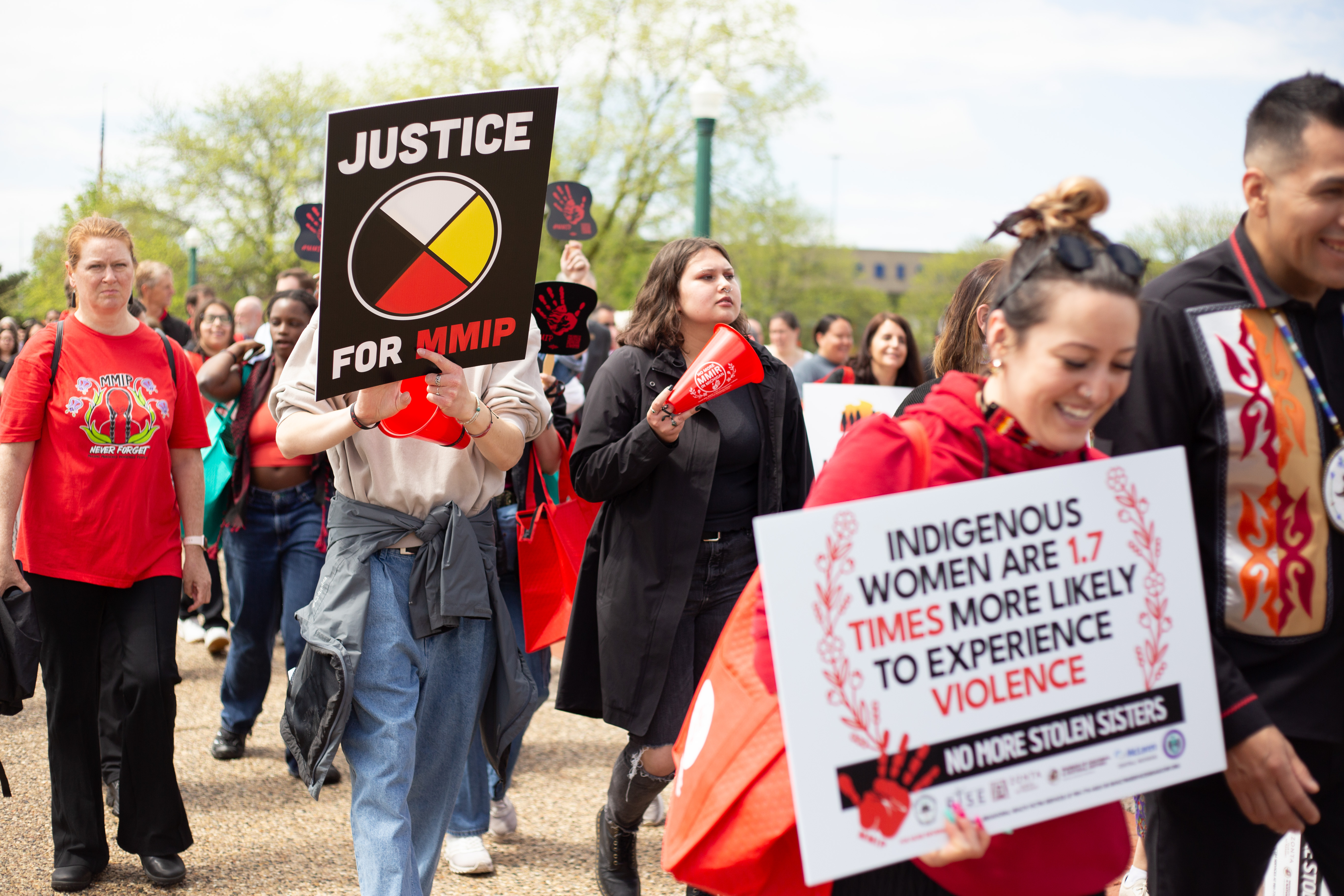
- Details
- By Elyse Wild
The gathering, organized by the state's MMIP task force, was one of hundreds that took place around Indian Country for National MMIP Awareness Day, proclaimed by President Joe Biden as Sunday, May 5. Many attendees wore red clothing and donned red hand prints on their faces. Red is the official color commemorating MMIP, drawn from the common Native belief that red is the only color spirits can see.
The event began at noon with a grand entrance from representatives of Michigan's 12 federally recognized tribes, followed by a water ceremony. Speakers included filmmaker Valerie Red-Horse Mohl (Cherokee); Uniting Three Fires Against Violence Project Director Sandra Pilgrim Lewis (Oglala Lakota Sioux); and Chief Judge of the Nottawaseppi Huron Band of the Potawatomi Tribal Court Melissa Pope. Representatives from regional chapters of the RedRum Motorcycle Club also spoke. Anong the speakers were Michigan Gov. Gretchen Whitmer, Congresswoman Hillary Scholten and U.S. Attorney for the Western District of Michigan Mark Totten.
Speakers addressed the factors driving the crisis, marked by the disproportionally high number of cold cases involving Indigenous people who go missing or are murdered.
The MMIP crisis is prevalent across the United States, with Indigenous peoples being murderedat a rate ten times the national average. Homicide is the leading cause of death for Native women ages 10-24 and the fifth-leading cause of death for Native women 25-34, according to the Bureau of Indian Affairs.
Advocates say jurisdictional confusion, systemic limitations, and apathy leave many cases unsolved. Devastated families in Native communities are often left to look for their loved ones alone.
In addressing the crowd, Whitmer underscored that lawmakers need to pay attention and take action to mitigate the crisis.
"We must remember that these issues are not unsolvable," Whitmer told the crowd. If we act, we can and will save lives."
She noted that Michigan is one of six states in a national pilot program launched in 2020 to address community response plans to MMIP cases.
Pope closed out the speaker portion of the event with a powerful call to Indigenous people and allies to become educated on the enduring impact of federal assimilation policies and intersecting disparities that culminate in the MMIP Crisis.
“The needs surrounding missing and murdered women and Indigenous people are long-standing issues connected to this country’s history of assimilation policies,” Pope said. “We need allies in this work, and we need every advocate to remember the historical trauma and suffering of Indigenous people throughout the U.S., including Alaska and Hawaii.”
The event concluded with a mile-long march through downtown Grand Rapids.
National MMIP Awareness was first recognized in 2017, prompted by a resolution introduced by Montana Senators Steve Daines and Jon Tester. The date of May 5 was selected to honor the birthday of Hanna Harris, a 21-year-old member of the Northern Cheyenne tribe who went missing on July 4, 2013. Events honoring the day will continue to take place across Indian Country throughout this week.
https://nativenewsonline.net/currents/hundreds-gather-in-grand-rapids-mich-for-mmip-awareness-event#sigProId1fae7945b0
More Stories Like This
Native Artist and Former Cultural Advisor to the Chicago Blackhawks Sues Team for Sexual Harassment, FraudFirst Lady Jill Biden 'Shows Up' in Indian Country
National Indian Gaming Commission Announces Sharon Avery as Acting Chair
The Jicarilla Apache Nation Mourns the Passing of President Edward Velarde
Genealogy, Elite Clubs Focus of 88-year-old
These stories must be heard.
This May, we are highlighting our coverage of Indian boarding schools and their generational impact on Native families and Native communities. Giving survivors of boarding schools and their descendants the opportunity to share their stories is an important step toward healing — not just because they are speaking, but because they are being heard. Their stories must be heard. Help our efforts to make sure Native stories and Native voices are heard in 2024. Please consider a recurring donation to help fund our ongoing coverage of Indian boarding schools. Donate to Native News Online today and support independent Indigenous-centered journalism. Thank you.

